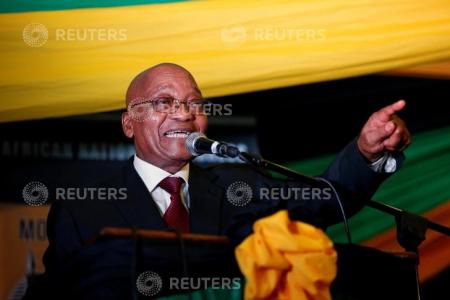
By Joe Brock and Tiisetso Motsoeneng
JOHANNESBURG (Reuters) – South Africa will come down hard on financial market abuse, President Jacob Zuma said on Thursday, following accusations that more than a dozen local and foreign banks had rigged rand currency dealing.
The Competition Commission said on Wednesday it had found the banks, including U.S., European, Japanese and Australian lenders, had colluded to coordinate their trading activities when dealing in the South African and U.S. currencies.
With the banks already a target for public anger, Zuma piled on the political pressure. “Government is ready to act against market abuse, price fixing and collusion in the private sector in order to protect our country’s economy,” he told parliament.
South Africa’s economy, which has hardly grown since emerging from a recession in 2009, remains largely in the hands white minorities more than two decades after the fall of apartheid. Of the four biggest lenders, which control more than 90 percent of the country’s banking market, all but Standard Bank have white chief executives.
The ruling ANC party on Thursday called for the toughest possible sanctions against the banks.
“The African National Congress takes an extremely dim view of the activities of the listed banks. These acts of corruption have crudely exposed the ethical crisis in the South African banking sector,” the party said in a statement.
“It is further an indication of how the markets are and can be manipulated by dominant oligopolies to cripple its functioning to suit their nefarious agendas.”
The National Treasury said it viewed the report seriously and that if found guilty the banks should be sanctioned accordingly.
“We view this matter in a very serious light and welcome any steps taken against wrong-doing by any financial institutions,” the Treasury said in a statement.
South Africa’s banking index fell as much as 1 percent after the Commission, which has been conducting an investigation since April 2015, recommended heavy fines be imposed on the lenders. By the end of session, the index had recouped all the losses.
GLOBAL SCANDAL
Financial regulators are clamping down worldwide, with dozens of traders fired and big banks fined around $10 billion in total in separate cases for rigging the level of the Libor interest rates and other market benchmarks.
The opposition Democratic Alliance accused the ANC of politicising the issue, saying ministers want “to do battle with the banks, regardless of the economic fallout”.
Michael Cardo, who speaks on economic development for the right-leaning party, said Zuma’s State of the Nation Address last week had made clear “he intends using the competition authorities as a tool of his populist and destructive agenda of ‘radical economic transformation'”.
Last year the ANC suffered its worst ever local election performance as the left-wing Economic Freedom Fighters (EFF) won over many poor black South Africans with promises of radical redistribution of wealth.
The EFF and sections of the ANC often criticise banks for keeping the wealth of the country in the hands of the white elite.
‘ZAR DOMINATION’
The investigation found that from at least 2007, banks had an agreement to collude on prices for bids, offers and bid-offer spreads for spot trades involving the rand – whose international market code is ZAR – and the U.S. dollar, the Commission said.
Its inquiry centred on an instant messaging chat room called “ZAR Domination”, which the Commission said was used to coordinate trading activities when giving quotes to customers who buy or sell currencies.
Fines should amount to 10 percent of the banks’ South African annual revenues, the Competition Commission’s spokesman Sipho Ngwema said. Under South African rules, companies can be fined a maximum of 10 percent of their turnover for anti-competitive conduct.
The Commission said it had referred the case for prosecution to the Competition Tribunal. This holds hearings on anti-trust matters before making a finding which parties affected can take to South Africa’s Competition Appeal Court.
The Banking Association of South Africa said it would support any judgement imposed on a bank that is contravention of South African law. “If the Tribunal finds any bank, or all relevant banks, wanting, the law must take its course and each bank must abide by the outcome,” it said in a statement.
The banks and brokerages named in the case were Citigroup, Nomura, Standard Bank, Investec, JP Morgan, BNP Paribas, Credit Suisse Group, Commerzbank AG, Standard New York Securities Inc, Macquarie Bank, Bank of America Merrill Lynch (BAML), ANZ Banking Group Ltd, Standard Chartered Plc and Barclays Africa (Absa), part of the Barclays Plc.
Investec and Barclays both said they would cooperate with the probe while Standard Bank, BAML, Commerzbank, BNP Paribas Nomura, Credit Suisse, ANZ and Standard Chartered declined comment. The others have yet to comment.
(Addition reporting by Ed Cropley, Mfuneko Toyana, Wendell Roelf and Ed Stoddard; Editing by David Goodman and David Stamp)
